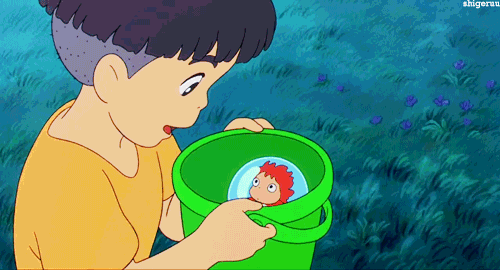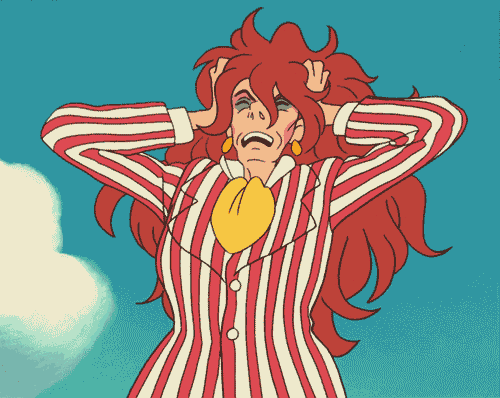#THIS IS FOR UNI I'M POSTING IT TO MY MAIN BLOG BC I FEAR NOTHING
Text
Platonic Readings of Ponyo (And How The West Likes to Ruin Everything)

We all love a good love story. It can be really satisfying to watch two characters slowly falling in love.
Unless they’re five. Then it’s kind of uncomfortable.
Welcome to the mildly disturbing world of the West taking platonic relationships and then forcing them to be romantic, even if the characters are five years old. All key quotes will be from the Japanese dub with English subtitles provided by Netflix.
All the anime I watched in high school is finally paying off.

“Ponyo… loves… Sosuke!”
Let’s start with some basic Japanese lessons. In Japanese, Ponyo says “Ponyo… Sōsuke… suki!” Ponyo uses suki, which is one of three popular ways of expressing love. There is aishite, a deeply passionate proclamation of love; daisuki, a more common expression to mean a softer love between couples; and suki, a word more suitably translated to ‘like’, which is more of a fondness, something used in a casual setting.
Wu argues that Ponyo ‘expresses her fondness for Sosuke’ in this moment (2016:197). The love that Ponyo displays for Sosuke here is something distinctly more childlike and innocent. It is little more that a proclamation of friendship or a slightly deeper bond.

“To become human, she requires a man that will understand and accept her.”
Granmamare does not use language that is inherently romantic – there is no mention of ‘love’. The phrasing of ‘a man’ implies a heterosexual bond which can be interpreted as romantic, but in and of itself, the sentence is mostly read as platonic.
And then the English dub happens. In her godlike voice, Cate Blanchett says, “To become a real girl, she needs you to accept and love her as she truly is.” This reading is inherently more romantic, using the dreaded L-word (not Lesbians, Scott Pilgrim, calm down) to force a romantic context onto Ponyo and Sosuke’s relationship.

“I’ll always love Ponyo, whether she’s a fish, a human, or in between.”
Here we go again with the use of suki. At this point, Ponyo and Sosuke are ‘beloved friend[s]’ (Wu 2016:199) and share a deep bond. This quote involves acceptance as a major factor of Sosuke’s relationship with Ponyo, and still uses the childish and censored suki to infer a promise more than a romance. They are not in love, per say, but perhaps there is a hint of something more when they grow up.
In the English dub, Sosuke declares, “I love all the Ponyos! It’s a big responsibility, but I’ll always love her.” This child is five years old. This sentence reads as a declaration of love and gives off more confession vibes. Yikes.

The original Japanese dub wrote Ponyo to ultimately be a piece about the friendship between two young children, capitalising on the nostalgia of youth and childhood friends to create a compelling piece that made me cry within the first twenty minutes of the film.
The English dub, however, made something almost creepy and difficult to watch.
And thus concludes my argument on sub v. dub and why sub is infinitely better 100% of the time. That is a joke, Twitter stans please don’t cancel me.

^ Raw footage of me watching the English dub.
Miyazaki H (director) (2008) Ponyo [animated motion picture], Studio Ghibli, Japan.
Wu C (2016) ‘Hayao Miyazaki’s mythic poetics: experiencing the narrative persuasions in Spirited Away, Howl’s Moving Castle and Ponyo’, Animation: an interdisciplinary journal, 11(2):189-203, DOI: 10.1177/1746847716643777
#THIS IS FOR UNI I'M POSTING IT TO MY MAIN BLOG BC I FEAR NOTHING#hello teachers and classmates. feel free to follow if you're feeling spicy. i'm sorry.#fly yells#writedunes#long post#i really want to put a read more but i think i broke the post editor so i might have to come back in a sec#ponyo#ghibli#oh my god i REALLY broke everything my gifs arent even THERE#ok i think i fixed it. sources are under the read more :)#i didnt source the bit about japanese words for love bc that shit is embedded in my brain#i never took japanese i was just a massive weeb
23 notes
·
View notes